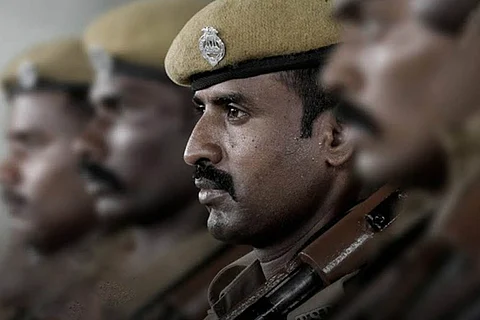

Deep in a mountainous jungle, an armed people’s movement is at war with the police. The state apparatus is scrambling to identify the mysterious leader of this movement — Makkal Padai (People’s Army) — who goes by the moniker Vaathiyar. The authorities don’t even know what he looks like. A young police constable (PC) is transferred to one of these remote outposts, setting him on a collision course with powerful men. Director Vetrimaaran’s Viduthalai - Part 1 seems set to tell a gritty political tale led by an actor few would have expected in such a serious and complex role.
When the cast for Viduthalai was announced, most Tamil movie watchers were surprised to see Soori in the lead. The actor had been seen so far only as a side character, creating his own brand of insult comedy, and was never given roles written with much depth. But Soori rises to his role in Viduthalai with such masterful screen presence, you wonder why Kollywood directors never saw his potential until now. The actor plays PC Kumaresan, newly transferred to a special force unit tasked with hunting down Vaathiyar. Vijay Sethupathi, or VJS as he’s fondly known, plays this elusive Vaathiyar (meaning Teacher). So elusive, we’re given barely a handful of scenes, which only contribute to the myth-building around his character.
Kumaresan is conscientious, without being preachy as most Kollywood heroes tend to be. He wants to do the right thing, often does, and finds that his own superior officers make his life hellish in retaliation. It would have been easier to write him as an underdog throwing around both punchlines and punches with loud, self-righteous zeal. But thankfully, Vetrimaaran doesn’t make such a tired cinematic choice. Kumaresan may be soft-spoken, but he has a quiet resolve despite being fearful of his position as the junior-most police officer in his unit. This is a rare kind of masculinity to see in a Tamil movie and deserves appreciation.
In that respect, a scene that was as surprising as it was a welcome change stands out. Kumaresan is apologising to his love-interest Thamizharasi (Bhavani Sre) for how he behaved after she shared a traumatic event in her past. He offers no excuse or justification for what he did. There's no glorifying of the fact that the hero himself is apologising, or any of the usual methods Kollywood would use, like shaming the woman, to play out such a sequence. It’s a simple scene of him taking complete accountability, done with touching tenderness and no fanfare.
The relationship between Thamizharasi and Kumaresan is far more mature than the cringeworthy love scenes common to Kollywood. Ilaiyaraaja’s music composition and singing voice provide a sublime backdrop to their romance, blending so perfectly into the film. But Bhavani Sre as Thamizharasi still leaves you a bit baffled. Her character’s contribution to the story is so minimal, it feels like an elaborate tokenism. The actor’s performance is uneven at best, and she’s the only female character one can put a name and face to in the film.
For a director who seems intent on being taken as a serious political commentator, Vetrimaaran’s own politics still leaves a lot to be desired.
On one hand, he registers his solidarity with the many real-life examples of communities that have fought to protect their forest lands from mining interests. He correctly points out how political power and corporate power work for each other’s benefits, while using the police as their violent enforcer. He also makes an emphatic statement against fascism and the ways in which laws such as the Terrorist and Disruptive Activities Prevention Act (TADA) allow abuses of power. Further, it merits mentioning that the director also shines light on the oppressive hierarchy within the police system that dehumanises low-ranking cops.
Vetrimaaran also doesn’t allow his story to excuse police brutality. He shows us instead how that brutality is pervasive and has a compounding effect down the ranks.
The only other Tamil film I can recall to have attempted to speak about such complexity was Franklin Jacob’s Writer. But unlike Franklin, Vetrimaaran makes disturbing cinematic choices in the way he translates that brutality onto screen. The director’s heart appears to be in the right place with this movie, but his gaze continues to be questionable. Like in his previous work, including the hit movie Asuran, Vetrimaaran still relies heavily on the shock and spectacle of graphically represented trauma. There are echoes of the brutalising images he recreated on screen in Visaranai in the many scenes of custodial torture we are shown in Viduthalai. This is worsened by the sexual assault of women in police custody, which Vetrimaaran depicts again and again with sickening detail.
Yes, it may be argued that the violence the director shows is historically accurate in terms of the torture unleashed on those from Left-leaning armed-struggles, whom the state brands as terrorists. It may also be argued that a majority of audiences would be unaware of this murky history. But telling that history needs to be rooted in compassion for those who suffered: in being committed to the dignity that was taken away from them. Kollywood repeatedly fails to understand that tactics such as recreating abuse and trauma are lazy tricks that expose a lack of politicised empathy.